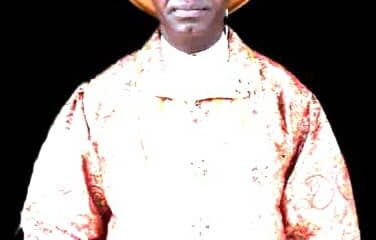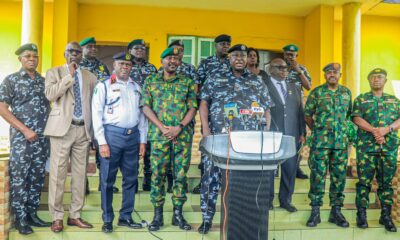News
FG Urges Effective Use Of Indigenous Languages
The Federal Government has stressed the need to promote the effective use of indigenous languages for communication especially at the grass root.
The Permanent Secretary, Federal Ministry of Education, David Adejo, said this in Abuja yesterday, at a One-day workshop on Preserving and Promoting Nigeria Indigenous Languages as Tool for National Development.
Adejo was represented by Dr Lydia Gigina, Director, Education Support Services in the ministry.
He said the promotion was aimed at stimulating the child’s interest in learning in order to avoid the loss of identity and also retain our unique cultural values.
According to him, the speakers of indigenous languages are not only identifying with their local communities, they also carry and promote the ethical values of their forebears.
“Thus, the indigenous language system unites them with the environment and this is crucial to their survival as well as the hopes and aspirations of their children and youths.
“In Nigeria, our indigenous languages are those languages that are spoken by native speakers within any given social set up.
“The socio-economic development of an individual or community is usually closely related to the use of the language of such indigenous community.
“Such an individual grows, learns and lean on the culture of his people through the effective use of the indigenous language,” he said.
The permanent secretary emphasised that every effective and efficient school curriculum was drawn from the culture and experiences of the people within the given environment of which their indigenous languages were key.
He, therefore, called for the promotion and protection of indigenous languages which should begin with strategic actions by the governments at various levels of federal, state and local councils.
He said that on the part of the federal government, there had been a National Indigenous Language Policy aimed at preserving and promoting indigenous languages.
“Some highlights of such policy initiatives are development and sustainability of curriculum on many of the indigenous languages and offering of one indigenous language by every student in the Junior Secondary Schools in Nigeria.
“Others are teaching and learning of indigenous languages at the SSCE, NCE and the various levels of degrees in the universities, encouraging the use of indigenous languages as alternative means of communication at public functions within a given environment.
“Using of indigenous languages as means of communication in some states Parliaments, encouraging the use of indigenous languages to present news on electronic media, “ he added .
He expressed concerns over the influence of foreign languages and culture on our indigenous languages, saying this had done a lot of harm to them.
According to him, such influence was palpable in every aspect of our people’s lives.
“In Nigeria for example, by reason of colonial experience, English Language has been adopted as the official language of communication. The Nigeria Educational system was first modelled after the British type of curriculum.
“This is bound to have negative impacts on the development of our indigenous languages.
“To check this trend, on Dec.15, 2022, the federal government approved the adoption of mother tongue as compulsory medium of instruction in Nigeria primary schools,” he said.
The NATCOM UNESCO Secretary General, Dr Idowu Olagunju said that indigenous languages should not be left to erodeset aside as this should be the pride of the country.
Olagunju blamed parents for contributing to the eroding of the indigenous languages, while calling on them to foster the teaching and learning of the language to promote our identity.
In the same vein, the Director, Educational, Planning and Research in the ministry, Mr Adeye Adeleye expressed concern over the non-documentation of languages which led to them being eroded.
Adeleye said that lack of properly developed linguistic phonemes and morphemes necessary for the teaching of some of the indigenous languages, were factors responsible for its eroding.
News
Tinubu Appoints Four Nominees Into NCDMB Governing Council

President Bola Tinubu has approved the nomination of four new members to the Governing Council of the Nigerian Content Development and Monitoring Board (NCDMB).
The Special Adviser to the President on Information and Strategy, Bayo Onanuga, in a statement yesterday, said the appointment is to fill existing vacancies and strengthen the board’s capacity.
The statement said the approved nominees are Mr. Olusegun Omosehin of the National Insurance Commission and Engr. Wole Ogunsanya of the Petroleum Technology Association of Nigeria.
Tinubu also endorsed the nomination of Sam Onyechi, who represents the Nigerian Content Consultative Forum and Barrister Owei Oyanbo from the Ministry of Petroleum Resources.
The President encouraged the new members to leverage their expertise and dedication to enhance local content development within Nigeria’s oil and gas industry.
It added, “The nominations arose from the exit of previous institutional representatives from the Governing Council.
“The NCDMB Governing Council, established under Section 69 of the Nigerian Oil and Gas Industry Content Development Act, 2010, comprises representatives from key institutions.
“These include the Ministry of Petroleum Resources, the Nigerian Upstream Petroleum Regulatory Commission, the Nigerian National Petroleum Company Limited, the Petroleum Technology Association of Nigeria, the Council for the Regulation of Engineering in Nigeria, the Nigerian Content Consultative Forum, and the National Insurance Commission.”
News
NDDC To Construct Hostels, Roads In UNIPORT – Ogbuku

The Niger Delta Development Commission (NDDC) has announced plans to construct additional hostels, rehabilitate roads, and enhance power supply in the University of Port Harcourt (UNIPORT).
NDDC’s Managing Director, Dr Samuel Ogbuku, disclosed this during a visit to the commission’s headquarters in Port Harcourt, yesterday by a delegation from the UNIPORT’s Governing Council.
Ogbuku stated that the NDDC had committed to upgrading facilities at UNIPORT as part of efforts to foster partnership with educational institutions across the Niger Delta.
According to him, the implementation of additional projects at the university forms part of a broader strategy to improve education standards in the region.
“Aside from the construction of new hostel blocks and installation of a 300 KVA solar inverter system, the NDDC will also facilitate more projects in the university.
“The commission will also deploy its engineers to assess the condition of UNIPORT’s roads and hostels for potential rehabilitation,” he said.
Ogbuku noted that upon completion, the projects would add to various initiatives previously undertaken by the commission at the university.
“These and other projects reflect our commitment to actualising President Bola Tinubu’s Renewed Hope Agenda in the Niger Delta region,” he added.
He reaffirmed the NDDC’s dedication to fostering development and strengthening partnerships across the region.
Earlier, Sen. Mao Ohuanbunwa, Chairman of UNIPORT’s Governing Council, who led the delegation commended the current leadership of the NDDC for its achievements in accelerating development in the Niger Delta.
He highlighted the university’s infrastructural challenges, noting that it lacked adequate facilities to accommodate its growing student population, and appealed for the NDDC’s support in addressing the shortfall.
“Currently, UNIPORT has a total student population of about 50,000, while its hostel accommodation capacity can only cater for 5,000 students.
“We therefore urge the NDDC to assist in the construction of additional hostels, improve transportation facilities, and facilitate the acquisition of gas turbines to enhance power supply for our students,” Ohuanbunwa pleaded.
The Vice Chancellor of UNIPORT, Prof. Owunari Georgewill, commended NDDC for its impactful projects across the Niger Delta and extended an invitation to the commission to participate in the institution’s forthcoming 50th anniversary celebrations.
News
Senate Rejects Motion To Rename INEC Headquarters After Humphrey Nwosu

The Senate has rejected a motion to rename the Independent National Electoral Commission (INEC) headquarters after the former chairman of the defunct National Electoral Commission, late Prof Humphrey Nwosu.
Nwosu presided over the June 12, 1993, presidential election, which was truncated by the former military President, General Ibrahim Babangida (rtd).
The election which was won by the late business mogul, Chief MKO Abiola, was adjudged to be the freest and fairest in the electoral history of Nigeria.
The motion to rename INEC after Nwosu was re-sponsored by Senator Enyinnaya Abaribe yesterday after lawmakers threw it out last Wednesday.
Abaribe called for posthumous national honours to be conferred on Nwosu in recognition of his role in Nigeria’s democratic evolution.
However, the proposal sparked a heated debate once again, with lawmakers deeply divided over Nwosu’s legacy.
Senator Osita Ngwu acknowledged that Nwosu operated under a military regime, which restricted his ability to announce the results.
He argued that “there was no way he would have announced the results with a gun to his head. That doesn’t change the fact that some of us see him as a hero.”
Senator Austin Akobundu, however, described it as most uncharitable for lawmakers to dismiss Nwosu’s contributions, insisting that he deserved a place in Nigeria’s hall of honour.
On the other hand, several senators like Senator Jimoh Ibrahim dismissed the idea outright, questioning why the Senate should honour someone who failed to announce the results insisting that “nothing should be named after him”.
Senator Cyril Fasuyi argued that history does not reward efforts, but only results.
“As long as he did not announce the result, whether under duress or not, I am against naming INEC headquarters after him,” he submitted.
Also, Senator Sunday Karimi criticised Nwosu for lacking the courage to speak out, while Senator Afolabi Salisu warned that immortalising him would undermine the memory of MKO Abiola, the widely accepted winner of the June 12, 1993, annulled election.
“Any attempt to do anything beyond a one-minute silence is to rubbish Abiola’s legacy,” he tendered.
After intense deliberation, most senators rejected the motion through a voice vote.
They, however, agreed to honour him with a one-minute silence and extend condolences to his family, effectively dismissing the other prayers to immortalise Nwosu.
-
Niger Delta5 days ago
World Water Day: Aging Facility, Bane Of C’River Water Board – Commissioner
-
Business4 days ago
Why No Elected Official Should Enjoy Immunity – Stakeholders
-

 Rivers5 days ago
Rivers5 days agoFubara’s Kinsman Denounce The Suspension Of Democratically Elected Officials
-

 Rivers5 days ago
Rivers5 days agoJoint Security Operatives In Rivers State Arrests Eight Criminal Suspects, Rescued Four Kidnapped Victims
-
Sports5 days ago
Kenya Keeper Under Investigation For Match-Fixing
-
Niger Delta5 days ago
Delta Among 4th Largest Economy in Nigeria – SSG
-
Politics4 days ago
Recall From NASS: INEC Confirms Petitioners’ Contact Details Receipt, Notifies Natasha
-
Nation5 days ago
HYPREP Inducts 100 Ogoni Youths For Seafaring Training

